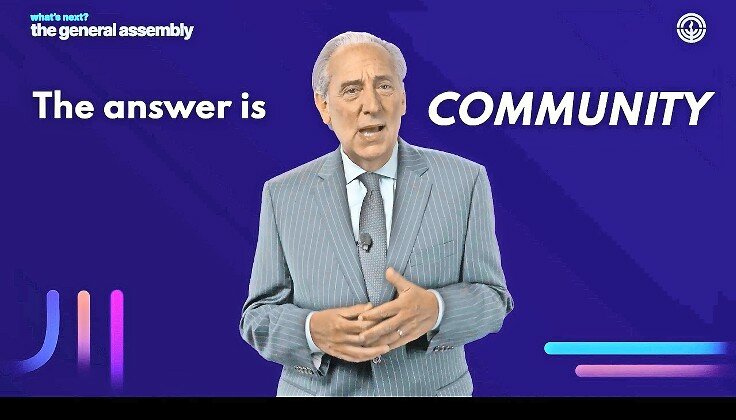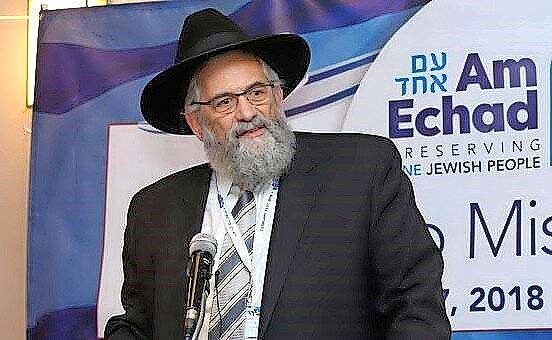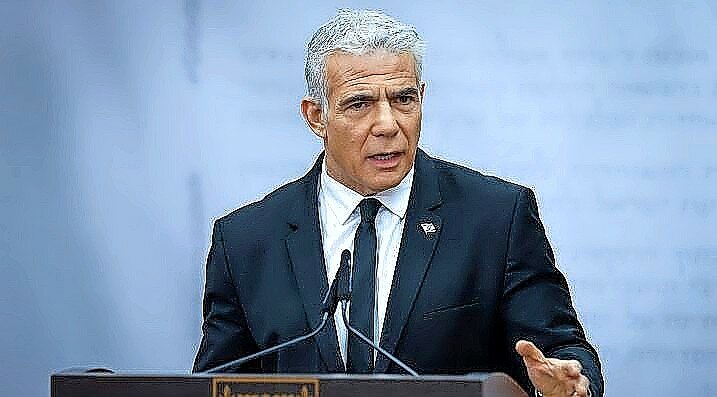Under fire, Jewish Fed head defends legitimacy
When 3,000 North American Jewish leaders convened in Israel this week for the Jewish Federations of North America’s 2023 General Assembly, they intended to reflect their “eternal love for Israel that transcends any difference of opinion or political discussion,” according to Eric Fingerhut, CEO of the umbrella group which represents 146 Federations and 300 smaller communities.
But controversy brewed ahead of the four-day JNFA GA, set to culminate on Israel’s 75th birthday on Wednesday, with critics saying the group has been meddling in domestic Israeli politics.
Last month, 30 federation leaders voiced concern about judicial policy in Israel after a 24-hour Israel “fly-in.” In February, JFNA sent a letter to Israeli Prime Minister Benjamin Netanyahu and opposite leader Yair Lapid with specific policy prescriptions, including that Israel “make clear that a majority of just 61 votes of the Knesset is not sufficient to override a decision of the Supreme Court.”
At the GA, Netanyahu canceled his speech ahead of expected protests on Sunday night, and on Monday, representatives of the Jewish Agency for Israel — a JFNA partner — were reportedly among those who repeatedly protested and heckled Simcha Rothman, a Knesset member who is a key figure in the government’s judicial reforms.
Irving Lebovics, co-chairman of Agudah-affiliated Am Echad, warned that “there will be a left wing that will try to co-opt that whole event and try to get the Federation to take a stance strongly supporting one side.”
If American Jewish leaders — whose websites tout the billions of dollars they collectively raise and distribute annually, including in Israel — dictate to Israel what to do, why is it antisemitic to hold world Jewry accountable for Israeli decisions. Lebovics asked.
“It’s not healthy. It never worked in Jewish history for the last thousands of years when we try to involve foreign governments in our internal issues. It’s inappropriate,” he added.
He noted that Rashad Hussain, US ambassador at large for international religious freedom, tweeted on April 16 that he met Kotel Rabbi Shmuel Rabinowitz and “reiterated US support for implementation of the 2016 Western Wall agreement to expand the egalitarian space at the wall.”
“What does this have to do with the United States government? Are we opining about how the mosque be set up for men and women, or about how the National Cathedral should conduct a service?” posed Lebovics.
Fingerhut, the JFNA executive, told JNS that his organization seeks the Jewish community’s “broad center.”
“We don’t dress alike. We don’t eat alike. We don’t pray alike. And yet, we have to care for each other,” he said. “We are very practiced at working across the broad center, and encouraging dialogue and discussion when we engage in any issues that are governmental. We always are working on a bipartisan basis in North America, so we carry that over to our work with Israel.”
Other public JFNA statements suggest otherwise.
Rather than stating that many of its members had one perspective and a minority held a different view, JFNA recently tweeted that it was “deeply troubled” by a federal judge’s ruling on the abortion drug mifepristone. Last year, JFNA stated that it was “extremely concerned about the medical risks” posed by the US Supreme Court’s decision in Roe v. Wade.
Fingerhut told JNS that JFNA balances questions of majority and minority “with great care and great intentionality.”
“We are always aware of the differing opinions in our community. It is an absolute requirement of our work that we listen to all of those opinions,” he said.
Israel ought to conduct its own political debates, but when the Jewish state’s actions “deeply affect” North American Jews, JFNA has a responsibility to communicate that, according to Fingerhut.
“It is impossible to overstate how important Israel’s fundamental democratic nature is to American Jews, and to our ability to build support for Israel in our community and in the broader community,” he said. “We could not see how we could square that provision with our description of Israel as the robust democracy, the model democracy it ought to be.”
Agudah had tried to get JFNA and other Jewish organizations to sign a statement with it about the importance of dialogue, according to Lebovics. Eric Goldstein, CEO of UJA-Federation of New York, who edited the document, and Fingerhut were ready to sign, noted Lebovics. “That was what I was told. All of a sudden, they put out a statement — I don’t think they meant it maliciously — but they put out a statement saying basically that the demonstrators have a right to demonstrate in Israel,” he said.
“It was, in my mind, a tremendously lost opportunity,” he said.
“You have a group of leadership, both in America and Israel, on the left that sees the vulnerability of this government and is going in for the kill. They’re basically trying to get the government out,” said Lebovics. “What they couldn’t do in the election, they are trying to do in the street.”
With US Jewish demographics changing, as the number of Orthodox Jews with a strong commitment to Israel increases, Lebovics raised the question of JFNA’s constituency.
“Forty percent of the Jewish population is unaffiliated,” he said. “Who exactly are you representing when you say, ‘We talk for the majority?’.”

 54.0°,
Mostly Cloudy
54.0°,
Mostly Cloudy 









